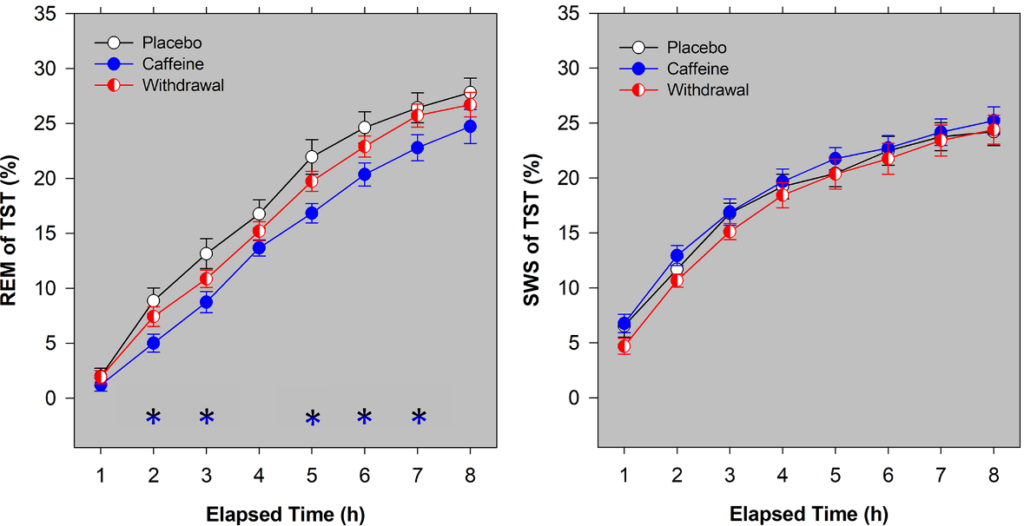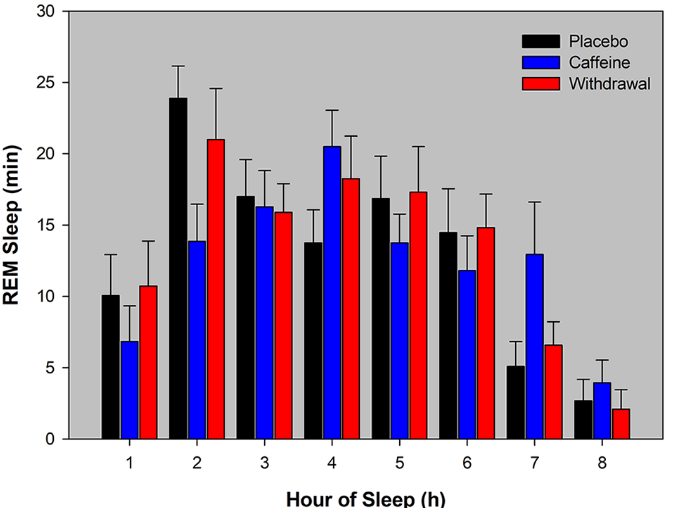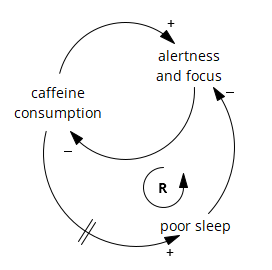A few days ago, I reflected on the importance of the REM sleep phase for knowledge workers. Today, I want to highlight a study related to this topic that investigates the effect on continuous caffeine consumption on this particular sleep phase.
The paper1 was written by Janine Weibel and fiends in 2021. In it, they investigated sleep statistics for three different ‘caffeine consumption configurations.’ Each participant was part of each configuration (group) once.
- This group was administered three doses of 150 mg/day for 11 days.
- This group was administered the same dose but received a placebo in the final two days.
- The last group received placebos for all 11 days.
150 mg of caffeine is roughly equivalent to: 3 cups of black tea (141 mg), 1.5 cups of brewed coffee (142.5 mg) or 2.5 shots of espresso (157.5 mg).
The capsules (caffeine and placebo) were administered 45, 255, and 475 min after waking up. If you’d wake up at 8:00, this means your last supplementation would occur at roughly 16:00.
The last 43 hours of each group’s 11-day experiment, participants were placed in a (very) controlled lab setting. There, they completed two full sleep cycles, the second of which was used to measure the slow-wave (i.e. deep) sleep (SWS) and rapid eye movement (REM) share of the total sleep time (TST). The results are shown in the two graphs below.

Accumulation of REM sleep and SWS proportion across the sleep opportunity of 8h, from J. Weibel et al. (2021).
The graphs show that the share of deep sleep does not appear to be significantly affected by caffeine levels. For REM% however, the effect is more significant. Both the withdrawal (2) and the continuous caffeine group (1) consistently underperform the no-caffeine group (3) in terms of REM-sleep during the 8-hour cycle.
A bit further into the paper, we can more clearly see why:

Amount of REM sleep in each hour spent asleep, from J. Weibel et al. (2021).
Here we can more clearly see that it isn’t necessarily the amount of REM-sleep that is so much reduced, but rather the timing of it. Where the peak REM% occurs after 2 hours of sleep for the withdrawal (2) and placebo group (3), the continuous-consumption group (1) had its peak 2 hours later. In other words, caffeine consumption during the day delays REM-sleep cycles.
Coming back to the argument I made two days ago; it might be the case that knowledge workers suffer more from cutting short on sleep. Now, we can also say that this effect is further exacerbated by continuous caffeine consumption.
The interaction here is interesting, and I’ve tried to illustrate it below:

When you consume caffeine, your REM-cycle is affected, and your sleep quality impaired. Because of this, you feel more tired in the morning (this was also confirmed in this study) and are encouraged to consume caffeine to feel more awake. This reinforcing cycle makes that you become ‘locked-in’ to a caffeine-routine. The only way to escape it would be to sleep for (say 2) extra hours on top of your typical cycle and to refrain from consuming caffeine afterwards.
It’s important to note that consuming caffeine is not a substitute for REM sleep. While you might be able to mitigate the ‘sleepiness’-effect, you still miss out on enhanced learning, memory consolidation, creativity, and emotional regulation. Furthermore, you will feel more refreshed when you wake up, not only after having your ‘first cup of Joe.’
This study and my previous post got me excited to add a new dimension to the ‘dry January’ that is upcoming. I’m curious to see how abstaining from caffeine (both coffee and tea) affects my sleep (which I can measure very roughly with my sports watch) and my sleep quality (which I can measure through maintaining a record of my results on the Leeds Sleep Evaluation Questionnaire). I’ll get back to you sharing the results in February!
Footnotes
- Weibel, J., Lin, Y.-S., Landolt, H.-P., Berthomier, C., Brandewinder, M., Kistler, J., Rehm, S., Rentsch, K. M., Meyer, M., Borgwardt, S., Cajochen, C., & Reichert, C. F. (2021). Regular Caffeine Intake Delays REM Sleep Promotion and Attenuates Sleep Quality in Healthy Men. Journal of Biological Rhythms, 36(4), 384–394. https://doi.org/10.1177/07487304211013995